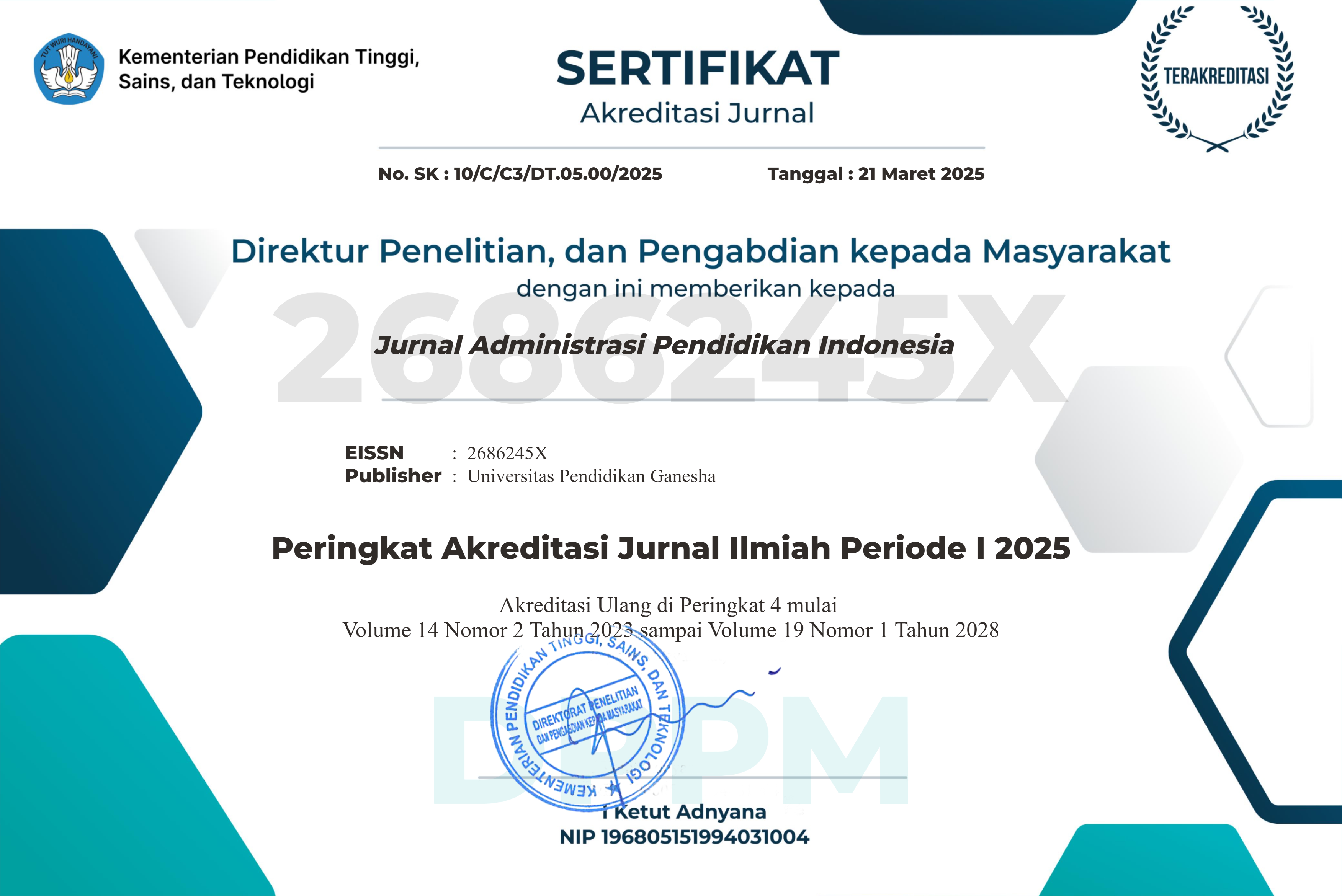Evaluation Of Use Digital Library State High School In Buleleng District
DOI:
https://doi.org/10.23887/jurnal_ap.v13i1.961Keywords:
evaluation, digital library, CIPPAbstract
This study aims to 1) determine the effectiveness of the digital library from the context component; 2) determine the effectiveness of the digital library of the input components; 3) determine the effectiveness of the digital library of process components; 4) determine the effectiveness of the digital library of product components; 5) knowing the effectiveness of digital libraries together in context, input, process, product; and 6) knowing the obstacles in using digital libraries at SMA Negeri Buleleng Regency. The research was conducted at SMAN 1 Singaraja, SMAN 1 Banjar, SMAN 1 Seririt, and SMAN Bali Mandara. This study uses a quantitative approach, this study uses an evaluation research design. The population in this study were all teachers from the 4 schools. The research sample was determined by using purposive sampling technique. Data were collected using questionnaires, documentation and interviews. Data analysis was carried out by converting the raw score into a Z score (z-score) followed by a T score and then converted into the Glickman quadrant. The results showed the effectiveness of using a digital library in terms of the context obtained effective results (+), the effectiveness of the use of digital libraries in terms of input obtained effective results (+), the effectiveness of using digital libraries in terms of process obtained less effective results (-), the effectiveness of using digital libraries in terms of the product obtained effective results (+). Overall, the evaluation of context, input, process, and product variables on the use of the digital library of SMA Negeri in Buleleng Regency is considered effective (+ + - +)
References
Agung, Anak Agung Gede and I. Wayan Koyan. 2016. Evaluasi Program Pendidikan (Fungsi Manajemen Kontrol). Singaraja: Universitas Pendidikan Ganesha
Agung, Anak Agung Gede and I. Wayan Koyan. 2020. Evaluasi Program Pendidikan. Singaraja: Prodi Teknologi Pendidikan Fakultas Ilmu Pendidikan Undiksha.
Antoro, Soji. 2020. Evaluasi Pengelolaan e-learning dengan model CIPP di SMA Negeri 5 Bengkulu Selatan. Jurnar manager pendidikan.Volume 15, Nomor 1, halaman 59-70.
Depdiknas .2003. Undang-undang RI No.20 tahun 2003.tentang sistem pendidikan nasional. Jakarta: Depdiknas.
Kadarsih, Pujianto, Muhajir. 2016. Evaluasi Digital Library AMIK AKMI Baturaja Menggunakan Hot Fit Model. Prosiding ANNUAL RESEARCH SEMINAR, Palembang: Universitas Sriwijaya.
Nova, I, W, Rita, Y, Bagus, W. 2019. “Evaluasi Program Pendidikan Pemakai Dengan Model CIPP di Perpustakaan Fakultas Teknik UGM”. JURNAL ILMU PERPUSTAKAAN DAN INFORMASI. Volume 3, Nomor 1, halaman 38-64.
Purwaningsih & Athanasia, O, P, D. 2019. “ Evaluasi Kualitas Layanan Perpuastakaan Digital IJATENG Menggunakan Metode Digiqual”. JURNAL ILMU PERPUSTAKAAN. Volume 8, Nomor 4, Halaman 214-227.
Sasangko & Hartanto. 2015. Evaluasi Perpustakaan Digital Perguruan Tinggi Berdasarkan Karakteristik Perpustakaan Digital. Yogyakarta: Jurusan Teknik Elektro UGM.
Sugiyono. 2018. Metode Penelitian Kombinasi (Mixed Methods). Bandung: ALFABETA.
Sunu, Arya, I G K. 2010. Pengelolaan Pendidikan Multikultural (Studi Kasus pada SMP/MTs di Provinsi Bali. Desertasi. Bandung: Universitas Pendidikan Indonesia.
Syahdatul, A’yan. 2019. Evaluasi Karakteristik Perpustakaan Digital Pada Perpustakaan Digital UNIMED. Medan: Departemen Studi Ilmu Perpustakaan dan Informasi.
Winda, A, A, Yani, N, Sony, W. 2019. “Evaluasi Guideline dan E-learning Digital Literacy Menggunakan Model CIPP”. JURNAL DOKUMENTASI DAN INFORMASI. Volume 4, Nomor 1, Halaman 99-104.











